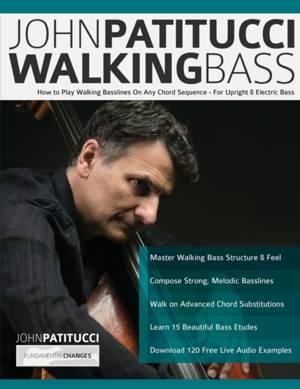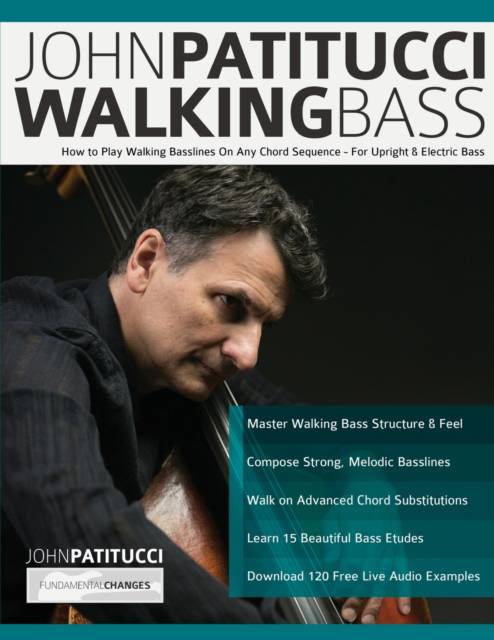
- Retrait gratuit dans votre magasin Club
- 7.000.000 titres dans notre catalogue
- Payer en toute sécurité
- Toujours un magasin près de chez vous
- Retrait gratuit dans votre magasin Club
- 7.000.0000 titres dans notre catalogue
- Payer en toute sécurité
- Toujours un magasin près de chez vous
John Patitucci Walking Bass
How to Play Walking Basslines On Any Chord Sequence - For Upright & Electric Bass
John Patitucci, Tim Pettingale, Joseph AlexanderDescription
Play jazz basslines by thinking like a composer
At the heart of his walking bass method, John Patitucci teaches you to think compositionally, and you'll discover that walking bass is not just a way to connect the chords by any means. He demonstrates how every line can be a strong melodic statement in its own right.
The musical way to master walking bass, with John Patitucci
You'll hone these essential skills on electric and upright bass:
How to compose and use well-conceived basslines with strong, driving melodies
Hundreds of walking bass movements so you can discover John's jazz vocabulary
How to tastefully spice up the harmony and walk on the most common progressions in jazz
A simple strategy to adapt your basslines when the chord changes are altered or substituted
Melodic walking bass from simple to complex
John Patitucci Walking Bass begins with a look at the essential ii V I VI7 sequence that forms the backbone of hundreds of jazz standards. However, each chapter develops this sequence further with essential harmonic concepts to alter the harmony... each of which becomes more radical as you progress.
This incremental bass method teaches you to walk on any chord changes, no matter how radical.
Discover the Four Guiding Principles John uses to compose strong, memorable basslines that have interest and momentum
Learn to focus your basslines to start simple, then add layers of complexity
Master 15 specially composed bass etudes that give unparalleled insight into John's walking bass approach and vocabulary
Each one of John Patitucci's 15 beautiful bass etudes is broken down into easy-to-digest cells, so you can learn quickly and efficiently.
Master Two-Beat and Four-Beat walking bass feel
Playing half time or "two-beat" is a technique all the bass masters have used, from Ray Brown to Paul Chambers. Each of John's 15 walking bass etudes begins with a two-beat passage to help you develop a deeper sense of feel and swing, before moving into a regular walking pattern.
Spécifications
Parties prenantes
- Auteur(s) :
- Editeur:
Contenu
- Nombre de pages :
- 100
- Langue:
- Anglais
Caractéristiques
- EAN:
- 9781789332131
- Date de parution :
- 18-03-21
- Format:
- Livre broché
- Format numérique:
- Trade paperback (VS)
- Dimensions :
- 216 mm x 279 mm
- Poids :
- 254 g

Les avis
Nous publions uniquement les avis qui respectent les conditions requises. Consultez nos conditions pour les avis.






